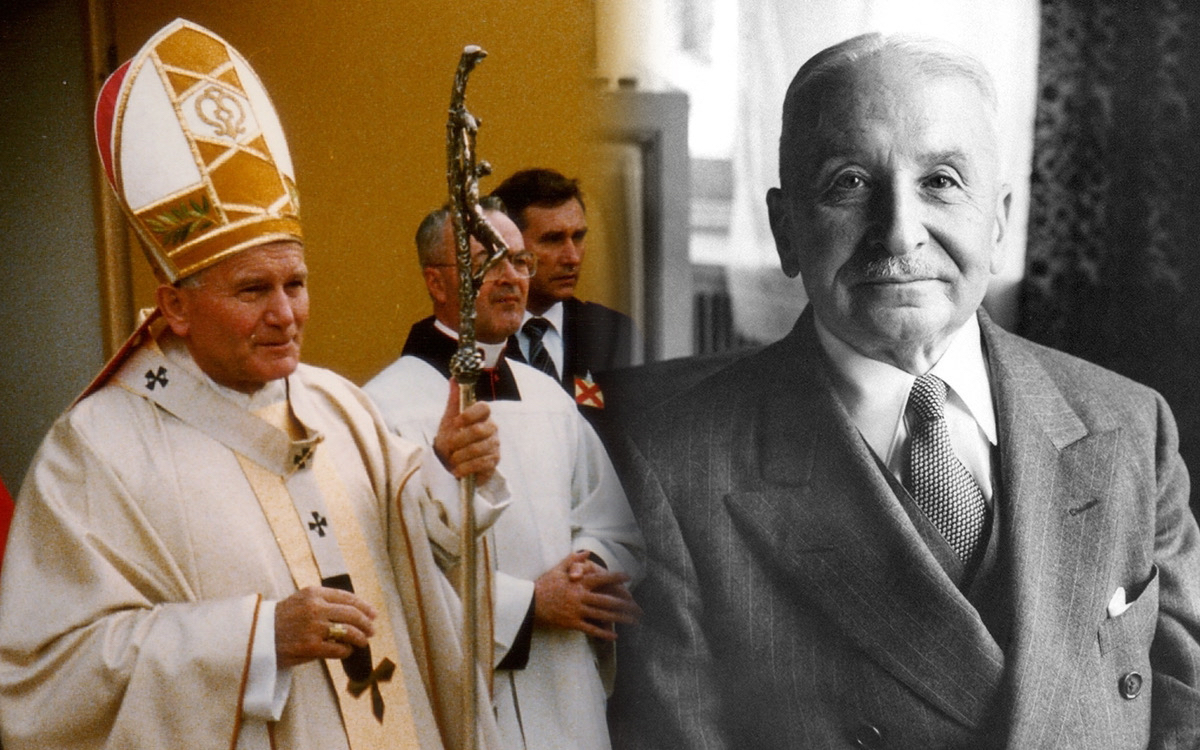Why would a theologian conduct a theological and moral analysis of human action as described by Ludwig von Mises, a representative of the Austrian school of economics? What can an economist and agnostic tell the moral theologian about man?
The Church teaches that economics is the science of human action and therefore it must have the right anthropological and ethical foundations. The purpose of The Pope and the Economist is to show that the description of human action in the economic sphere presented by Mises corresponds with the Christian concept of the person we find in modern Catholic Social Teaching. Such an analysis is possible because, in contrast to mainstream economics, Mises is interested in the real man in action and not in the fictitious homo economicus.
In his economic treatise Human Action, Mises developed his own anthropological concept of man. A precondition for human activity is the desire to replace the less satisfactory state of affairs with a more satisfying one. Mises’ individual is guided by his own scale of values and builds it on the basis of the goals he freely chooses. Mises also recognizes that the market is only a part of reality and human activity. All this was an encouragement for me, as a theologian and missionary, to investigate whether the concept of man in the Austrian economist’s writings coincides with that of the Church. Theology and Mises speak of the man in action. Moral theology speaks of the person and his deeds, and Mises talks about the individual and her activities in the economic sphere. They use different words, but might the content behind them—defining the human person as a free, rational, and transcendent being—be the same?
I was inspired by the work and publications of the Acton Institute, in particular the idea of economic personalism, which invites us to think about economic life according to the principles of ethical personalism and free-market economics. I understood that, without reference to the laws governing human action in economics, Christian personalism would be a pure abstraction. Economic personalism proposes to synthesize personalism with an appreciation of the market economy as developed by the Austrian school of economics. This idea prompted me to use Mises’ praxeology to comprehend and describe human action in the economic sphere. I believe that Catholic Social Teaching, which is part of moral theology, needs a comprehensive conceptual basis, without which a deeper theological and moral analysis of human action in the market would be difficult and incomplete.
The free market is not in opposition to Catholic Social Teaching, and what is more, it is completely compatible with it in many matters. This was demonstrated by Thomas Woods, an American historian who studied the most important documents and encyclicals of the Catholic Church on the social issues, beginning with St. Augustine, going to the Summa Theologiae of St. Thomas Aquinas, and ending with the most important encyclicals, including, among others, Rerum Novarum (1891) of Pope Leo XIII, Quadragesimo Anno (1931) of Pius XI, and Centesimus Annus (1991) of John Paul II. Woods is not a moral theologian and therefore he is more interested in the free-market mechanisms, which he analyzes from the perspective of the Austrian school of economics. As a moral theologian, I go much further and draw on the encyclical Veritatis Splendor (1993) of John Paul II, because my goal is to analyze the essence of the moral act from the free-market perspective. As George Weigel aptly noted, the personalism of John Paul II is deeply rooted in the philosophical assumptions of Fr. Karol Wojtyła—for whom philosophy was never an end in itself. For this reason, I refer to Wojtyła’s philosophical work, The Acting Person, and I perceive that the convergence of the title with Mises’ economic treatise Human Action is not accidental. The professor of ethics, who later became pope, attempted to combine Aristotelian-Thomistic realism with modern subjectivism. He developed his own original version of personalism on the basis of Thomism and phenomenology, where the acting person is able to know the reality and value of his action as a free and rational entity. In my opinion, this way of analyzing human action perfectly complements the concept of the person, operating in the economic sphere, who bases his action on subjective choices described by the Austrian economist.
My work focuses entirely on the personalistic interpretation of human activity in the socioeconomic dimension presented by Mises. It is important to study it in the context of the depersonalization of human labor currently developing and its economic effects in a world dominated by state intervention. Human action should be based on the fundamental truth of Christian personalism, showing the inalienable dignity of every human being who, in the form of the personalist norm, demands the affirmation of every other human person for his or her own sake. To serve this purpose, I carry out an in-depth analysis of human action based on a subjective theory of values, which is the original starting point to agree on two important dimensions of human life: the moral sphere and the economic one. Bearing in mind the details of divine revelation and the doctrine of the Church—especially the social teaching of Pope John Paul II—I indicate the possibilities for practically applying this theory in the lives of Christians, especially in social policy.
I study economic goods, human work and its subjective dimension, and the value of money and its socio-moral significance in the axiological context. The originality of my work lies in the fact that I analyze the concept of the human person according to Mises in the context of the moral experience of human existence taken holistically; that is, in the supernatural dimension. On the one hand the subject of theological analysis is man with the whole truth of his existence, and on the other hand God, whom he not only learns about conceptually but also by confronting his will, which is expressed in the laws of economics and moral life. This approach to the human person, included in the vortex of socioeconomic activity, allows me to understand his existential situation in the context of his relationship with God, the creator of the world and society. Consequently, this leads me to try to recognize the most valid and effective concepts of economics, which are best able to respect the rights of the person and interpersonal relationships and to satisfy the material needs of individuals and human communities.
Mises claims that man in action is guided by his own scale of values. The goals of human action are subjective and thus every human being has to designate them. I want to show that this has nothing to do with moral relativism and autonomous morality, because every man must himself discover God as the goal of his life. Economic liberalism is not only consistent with Catholic Social Teaching, but it is a much more ethical proposition than any kind of “third way” project.
Capitalism is often accused of concentrating on the production of goods, which can become an end in itself. Analyzing Mises’ ideas, I show that the production of goods is a byproduct of human freedom. Man needs material things to achieve his goals. Following the arguments of the Austrian economist, I defend his position that the free market surpasses other economic systems not only in terms of production and distribution of material goods but above all because it gives the acting person satisfaction in achieving goals that the free person puts before himself—goals that are not merely earthly.
Mises was an agnostic, but he claims that human goals can be metaphysical and in no way does this weaken the action of the man who performs them in the economic sphere of the earthly dimension. Many opponents of Mises say that the man depicted in Human Action can create a subjective truth and then close himself in his immanent world. I try to show something opposite: that in his freedom man is capable of accepting objective truth that is not a figment of his imagination, getting beyond his world, and striving for the transcendent Truth. That is what the Christian does. He chooses Christ who is the Truth ( John 14:6). Following Mises’ line of reasoning, I am in favor of the free economy, a system in which every person is allowed to act and choose freely.
This essay is excerpted from The Pope and the Economist: Human Action in the Thought of John Paul II and Ludwig von Mises by Jacek Gniadek, SVD, translated by Jan Klos (Acton Institute, 2023).

